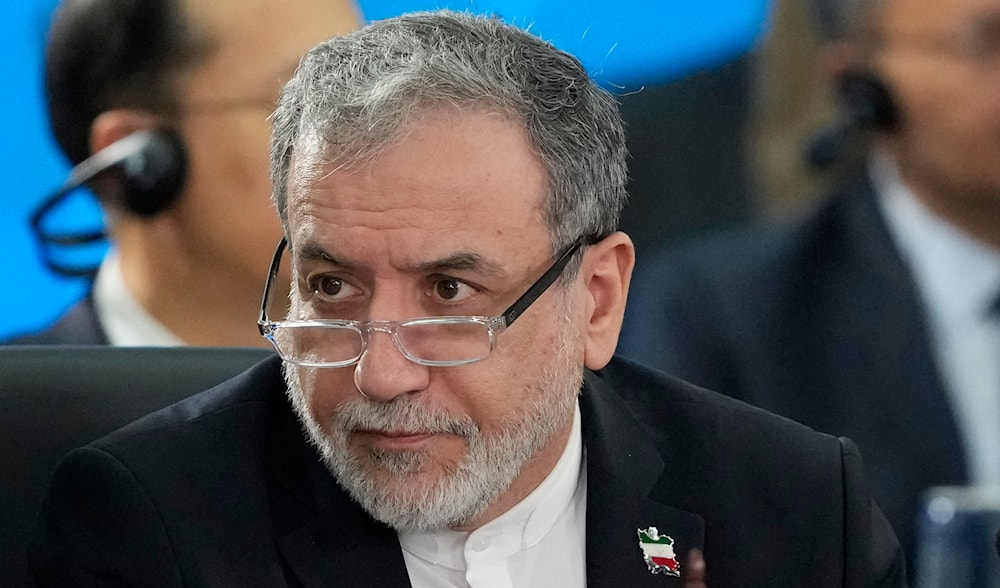Araghchi: E3 made 'big mistake' on snapback sanctions
Iran's FM warns Europe made a "grave miscalculation" by reimposing nuclear sanctions, accusing the E3 of abandoning diplomacy to follow Trump's hardline approach.
-

Iran's Foreign Minister Abbas Araghchi attends the 17th annual BRICS summit in Rio de Janeiro, Brazil, July 7, 2025. (AP Photo/Eraldo Peres, File)
Iranian Foreign Minister Seyyed Abbas Araghchi has issued a sharp rebuke to Britain, France, and Germany over their decision to reimpose UN sanctions on Iran, arguing that the European powers have made a "grave miscalculation" in following Donald Trump's hardline approach.
In a strongly worded opinion piece published in The Guardian, Araghchi accused E3 nations of abandoning their role as a moderating force in favor of enabling American excesses in the Middle East.
"For more than two decades, Europe has been at the heart of the ongoing, manufactured crisis over my country's peaceful nuclear programme," Araghchi wrote. "Once a moderating force aspiring to restrain a belligerent America with maximalist aims in our region, Europe is today enabling the excesses of Washington."
The Iranian Foreign Minister was responding to last week's decision by Britain, France, and Germany to activate the "snapback" mechanism for UN sanctions on Iran under the 2015 nuclear deal, formally known as the Joint Comprehensive Plan of Action (JCPOA).
Araghchi dismissed the move as lacking "any legal standing, chiefly because it ignores the sequence of events that led Iran to adopt lawful remedial measures under the nuclear deal."
Accusations of historical revisionism
The Foreign Minister accused the E3 of attempting to rewrite history regarding the nuclear agreement's collapse. "The three countries want the world to forget that it was the US, and not Iran, that unilaterally ended participation in the Joint Comprehensive Plan of Action," he argued.
He further criticized European nations for "their outrageous welcoming of the bombing of Iran in June" and failing to uphold their commitments under the original deal.
According to Araghchi, the European approach stems from a misguided belief that demonstrating loyalty to Washington will secure them influence on other global issues. "This is a grave miscalculation that is bound to backfire," he warned. "President Trump has made clear that he views the E3 as tangential actors."
Historical context and missed opportunities
Reflecting on the evolution of European-Iranian relations, Araghchi noted that when the E3 was formed in 2003 "to rein in the George W Bush administration after its invasions of Afghanistan and Iraq, Iran welcomed the endeavor." However, those early talks collapsed when "Europe could neither offer anything substantial nor stand up to Washington."
He also traced the path that led to the 2015 nuclear deal, describing "an eight-year race of sanctions v centrifuges between Iran and the west, during which my country amassed 20,000 centrifuges, 100 times more than in 2005."
He emphasized that the JCPOA represented a successful formula, "unprecedented oversight and curbs on Iranian enrichment in exchange for the termination of sanctions. The formula worked."
European promises unfulfilled
Araghchi highlighted European leaders' initial resistance to Trump's withdrawal from the nuclear deal, quoting French Finance Minister Bruno Le Maire's declaration that Europe is not a "vassal" and European commitments to maintain "strategic autonomy" in trade relations with Iran.
"None of it materialized," Araghchi wrote bluntly. "While failing to uphold its own obligations, Europe has expected Iran to unilaterally accept all restrictions."
The Iranian top diplomat warned that the European gambit "will not achieve the result they seek. On the contrary, it will only further sideline them by eliminating it from future diplomacy, with broad negative consequences for all of Europe in terms of its global credibility and standing."
Despite his criticism, Araghchi emphasized that "Iran remains open to diplomacy" and is "ready to forge a realistic and lasting bargain that entails ironclad oversight and curbs on enrichment in exchange for the termination of sanctions."
He cautioned against missing this opportunity, "Failing to seize on this fleeting window of opportunity may have consequences destructive for the region and beyond on a whole new level."
Regional security implications
Araghchi concluded with a stark warning about regional military dynamics, asserting that "the powerful armed forces of Iran are ready and able to once again pummel Israel into running to 'daddy' to be bailed out."
He argued that "Israel's" actions "cost American taxpayers billions of dollars, robbed the United States of vital hardware that is now missing from its inventories, and projected Washington as a reckless actor dragged into a rogue regime's wars of choice."
The Foreign Minister's final appeal was direct: "If Europe truly wants a diplomatic solution, and if President Trump wants the bandwidth to focus on real issues that are not manufactured in Tel Aviv, they need to give diplomacy the time and space that it needs to succeed. The alternative is not likely to be pretty."

 5 Min Read
5 Min Read










